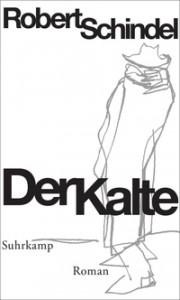
Robert Schindel "Der Kalte"
Vienna. In the lobby of Vienna's Akademietheater I run into the writer Doron Rabinovici, who says to me: "Hello, Sissy!" I have not read Robert Schindel's new novel yet so I don't know that I appear as a - tiny - character in his new book "Der Kalte", which will be presented here tonight. I look at my exboyfriend questioningly and he smiles: "I am your Boaz."
Robert Schindel himself explains later in a talk on stage with former cultural minister Rudolf Scholten: "Everyone called Arthur Schnitzler's novel "The road into the open" a "key novel". But only a few years after it came out in 1908 the real models were forgotten. The book had taken on its own life. Vienna's city gossip of the turn of the century had quickly been forgotten. "I hope my book will suffer the same fate", Schindel smiles.
It's true: The story of the election of Kurt Waldheim, the foundation of the Anti-Waldheim-Plattform "Neues Oesterreich", the long awaited debate about Austria's role in the Third Reich, the politization of a whole generation and the resulting opening of parts of the society - it's all already history. It is, however, slightly destabilising that my own Viennese years transferred into past tense. 25 years later the 80ties in Vienna look rather old. And so do we.
„Der Kalte“, "The Cold one", title and central figure of the book, is an Auschwitz survivor. He continues to live, but his memories come to haunt him. He will always feel emotionally cold. Schindel writes with his very own Viennese melody, which also gave his first novel "Gebuertig" 20 years ago its very special tone. The Schindel mix of poetry and prosa brings together the layers of the city, in which Eastern European immigrants mixed with the leftovers of the Austrian Hungarian empire. It’s the Vienna where communists and national socialists grew up. Schindel's Jewish intellectuals sit in the coffee shops, the old Nazis inhabit the pubs and the man, who lied about his past in the war and was elected because of and despite of it, sits lonely in his imperial office behind Heldenplatz and muses: "Pity that because of the „campaign“ against me only the Arabs invite me to visit!"
Schindel moves through Vienna as if the whole city was his "Stammtisch", his usual table in his favourite restaurant. I walk and sit with him, listen to the conversations of his heroes and antiheroes, a happy voyeur in my own past. We did indeed roam the streets like this at the time, and even if this country will forever stay the "Waldheimat", at least Vienna will also always be the city which was not contend to be held hostage by old nazis and young xenophobes, who want to keep the city in their petit bourgeois and evil clutch. The "Heldenplatz" was not only the central square, on which Adolf Hitler spoke during the "Anschluss" in March 1938. "Heldenplatz" is also the name of a play, which Thomas Bernhard wrote in 1988. He put his finger on the burning wound of Austrian historical forgetfulness and the narrowmindedness of its society. No miracle Schindel includes the events surrounding the staging of Bernhard's play on Vienna’s main stage, the Burgtheater.

At the book presentation on February 22nd most of us thought less about "Vergangenheitsbewaeltigung" as Austrians call the work we tried to do in order to recognize responsibility for the country's past. Most of the people who came to the public reading kept guessing, who was who in the book. Although Schindel had (with a broad smile on his face) explained that he had only taken certain personnages out of Viennese society as if he was working in a quarry. These rocks he formed into his own literary characters. That's how the young intellectual Boaz comes to a pessah seder with his blond girlfriend Sissy, who does not have a clue what is going on but still pretends to be perfectly comfortable to follow the Pessah "Haggadah" which is in Hebrew. More or less this is how it was and now we have it printed in black and white.
The English translation is not available yet.
http://www.suhrkamp.de/buecher/der_kalte-robert_schindel_42355.html


